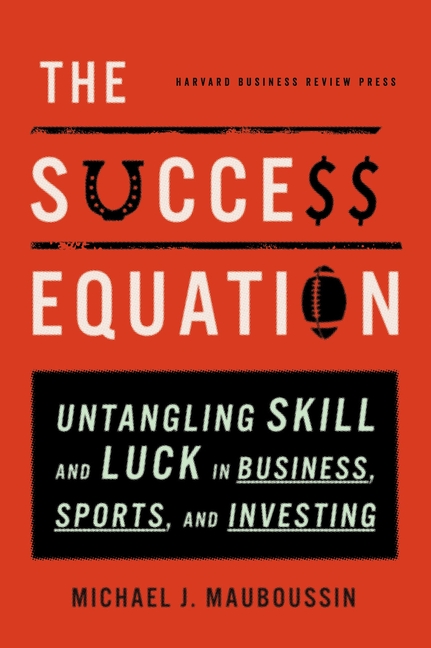Jack Covert Selects - The Success Equation
November 09, 2012
The Success Equation: Untangling Skill and Luck in Business, Sports, and Investing by Michael J. Mauboussin, Harvard Business Review Press, 320 Pages, $27. 00 Hardcover, November 2012, ISBN 9781422184233 Probability and percentages have been a hot topic this campaign season, as pollsters and poll watchers placed their bets on the numbers coming in and pundits argued that the numbers alone do not—cannot—reveal all.
The Success Equation: Untangling Skill and Luck in Business, Sports, and Investing by Michael J. Mauboussin, Harvard Business Review Press, 320 Pages, $27.00 Hardcover, November 2012, ISBN 9781422184233
Probability and percentages have been a hot topic this campaign season, as pollsters and poll watchers placed their bets on the numbers coming in and pundits argued that the numbers alone do not—cannot—reveal all. As polls trackers worked to hone their skill and perfect their formulas, pundits relied on their extensive experience in the field and gut feeling. So who was right, and why? Did it demonstrate a particular skill, or were they simply lucky?
How much of your accomplishments can you attribute to skill and how much to luck? And why does that matter? Michael Mauboussin believes that when we understand which factor dominated—skill or luck—it leads to better decision-making and improved performance.
The purpose of this book is to show you how you can understand the relative contributions of skill and luck and how to use that understanding in interpreting past results as well as making better decisions in the future. Ultimately, untangling skill and luck helps with the challenging task of prediction, and better predictions lead to greater success.
Many sports anecdotes populate the book, as the subtitle would sugest, but Mauboussin consistently relates those anecdotes and the statistics backing them to business, investing, and even nation-building. What is particularly eye-opening is how our own desire for a rational narrative colors our judgment of whether the eventual outcome derived from skill or luck.
We re-create events in the world by creating a narrative that is based on our own beliefs and goals. As a consequence, we often struggle to understand cause and effect, and especially the relative contributions of skill and luck in shaping the events we observe. … [W]e may make the mistake of drawing conclusions from samples that are too small. We may fail to consider all of the causes that might lead to particular events. We might test too much—so much, in fact, that we wind up finding causes where we're simply seeing the results of chance.
In Chapter 11, “The Art of Good Guesswork,” Mauboussin presents ten suggestions for applying what we’ve learned about luck and skill in the book to the real world, avoiding the pitfall of similar books that remain too theoretical. And at the end of the book, Mauboussin opens the curtain and reveals the rigorous attention to detail and extensive research behind the scenes he portrays—twenty pages of notes and fifteen pages of bibliography—that really grounds The Success Equation.
Don’t be discouraged however, because the book’s tone is engaging and its anecdotes relatable. If you liked Michael Lewis's Moneyball, with it’s mix of data and great storytelling, you’ll very much enjoy Michael Mauboussin’s Success Equation.



